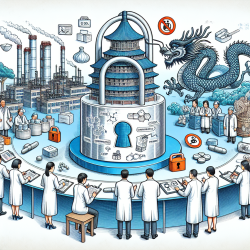The pharmaceutical industry is under constant scrutiny to ensure that drugs are produced safely and effectively. Good Manufacturing Practice (GMP) standards are critical in maintaining these high standards. A recent study titled "Characteristics, Risk Management and GMP Standards of Pharmaceutical Companies in China" offers valuable insights into how company characteristics and risk management affect GMP compliance. This blog post explores key findings from this research and provides actionable steps for pharmaceutical practitioners to improve their GMP compliance.
The Importance of GMP Standards
GMP standards are essential for ensuring that pharmaceutical products are consistently produced and controlled according to quality standards. They cover all aspects of production, from raw materials to final products. However, achieving and maintaining GMP compliance can be challenging due to varying regulations across countries and the complexity of pharmaceutical manufacturing processes.
Key Findings from the Research
- Higher Standards for Foreign-Owned Enterprises: The study found that foreign-owned and private enterprises in China tend to have higher GMP compliance compared to state-owned enterprises. This is attributed to stricter internal controls and adherence to international standards.
- Impact of Financial Independence: Enterprises that are less reliant on bank loans tend to perform better in GMP inspections. This suggests that financial independence allows companies to invest more in quality assurance and infrastructure.
- Value of Fixed Assets: Companies with higher fixed assets generally receive better GMP inspection results. This indicates that larger companies with substantial resources can maintain higher production standards.
- Experience of Quality Authorized Staff: The longer the tenure of quality authorized staff within a company, the better the company's GMP inspection results. Experienced staff are crucial for maintaining consistent quality control processes.
Strategies for Improving GMP Compliance
The research provides several insights that can help pharmaceutical companies enhance their GMP compliance:
- Invest in Quality Control: Allocate resources towards improving quality control measures. This includes hiring experienced staff and investing in training programs to ensure all employees understand GMP requirements.
- Enhance Financial Stability: Reduce reliance on external funding by improving financial management practices. This will allow more flexibility in investing in necessary infrastructure and technology upgrades.
- Adopt International Standards: Align your company's practices with international GMP standards. This not only improves compliance but also enhances your company's reputation globally.
- Focus on Long-Term Staff Retention: Implement strategies to retain experienced quality control staff. Their expertise is invaluable in maintaining high production standards.
The Global Implications
The findings from this study have significant implications not only for China but also for pharmaceutical companies worldwide, especially those in developing countries. By understanding the factors influencing GMP compliance, companies can implement more targeted strategies to improve their production processes and meet regulatory requirements.
The research underscores the importance of strong internal controls, financial stability, and experienced personnel in achieving high standards of drug safety and efficacy. As the global pharmaceutical industry continues to evolve, these insights will be crucial for companies striving to maintain competitive advantage while ensuring public health safety.
For practitioners looking to delve deeper into this topic, further research is encouraged. Understanding the nuances of GMP compliance across different regions can provide valuable lessons for improving global health outcomes.
To read the original research paper, please follow this link: Characteristics, risk management and GMP standards of pharmaceutical companies in China.










